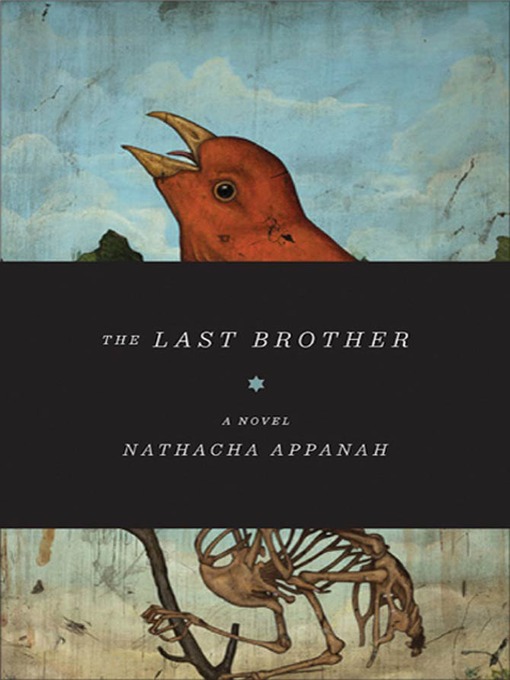
The Last Brother
A Novel
- اطلاعات
- نقد و بررسی
- دیدگاه کاربران
نقد و بررسی

Starred review from October 18, 2010
In Appanah's impressive novel, two young boys living in Mauritius during WWII secretly become friends. Eight-year-old Raj and his two brothers live on a sugar plantation where their parents eke out a marginal living. But Raj's brothers are swept away in a torrent, and the family moves to the heart of the island, where his abusive father finds work as a prison guard, overseeing European and Jewish inmates exiled from Palestine by the British to Mauritius, where they await the war's end. Here Raj meets David, a detainee close to his age, and feels an immediate kinship with him despite Raj's father's warnings that the prison holds dangerous men. When Raj's father beats him so severely that he's admitted to the prison infirmary, his friendship with David deepens; the love Raj can no longer give his brothers he offers to David. Weather once again intervenes in Raj's life when a cyclone hits the island, and he and David attempt to outrun their fates together. Appanah's descriptions are meticulous, and the heartbreakingly endearing Raj makes for an unforgettable protagonist.

November 1, 2010
A short, deceptively rich novel, translated from the French, that illuminates an obscure footnote in World War II history.
The narrator of the prize-winning fourth novel by Appanah (Blue Bay Palace, 2009, etc.) is a 70-year-old man from her native Mauritius, an island in the Indian Ocean, obsessed with an incident that changed his life when he was nine years old. With a perspective that more often reflects a young boy's innocence than the old man's experience, Raj describes the bond he developed with a Jewish boy named David, orphaned in the Holocaust, exiled to the island's prison after exiles were denied entry into Palestine as illegal aliens. Raj's impoverished family had lost his two brothers to a fatal storm, and his brutal father works as a guard at the prison. In the hospital (where Raj lands after a particularly brutal beating from his father) and on the grounds, the two boys bond, sharing a similarity of name (each is "king" in his culture, one of the parallels that is a little too pat) and experience (both have suffered deep losses and feel essentially alone). The reader learns from the start that Raj has survived and that David has died, a tragedy that elicits complicated feelings of complicity and guilt in Raj. "What I want to do is tell precisely what happened, it is the least I can do for David, I want to tell what matters, I want finally to put him at the center of this story," he says. Yet Raj can only bear witness, offer his own testimony, with some elements of David's story buried with him. What he tells of David is Raj's rite of passage: "This feeling, like a rising and falling tide of nausea, was the loss of childhood and the awareness that nothing, nothing from now on, would protect me from the terrible world of men."
In poetic, occasionally rapturous prose, the novel extends beyond the Holocaust in its attempt to encompass the human condition.
(COPYRIGHT (2010) KIRKUS REVIEWS/NIELSEN BUSINESS MEDIA, INC. ALL RIGHTS RESERVED.)

January 1, 2011
In this lyrical and quietly moving work, an old man recounts an event from childhood that has marked him irrevocably. In December 1940, a ship carrying 1500 Jews was turned away from Palestine and sailed on to Mauritius, an island off Africa's southeast coast. Nine-year-old Raj's father is a guard at the Beau-Bassin Prison, where the Jews were housed. The lonely Raj, whose two brothers had died in a terrible storm, ends up at the prison infirmary after his father beats him yet again. There, he forms an astonishing bond with blond-haired David, who seems, in that stale phrase revivified here, like Raj's better self. The description of their friendship is idyllic, but readers know from the start that something terrible happened to David, and the suspense can be unbearable as the story slowly unfolds. In a crucial scene, Raj intervenes to keep David from helping a fellow Jew being beaten (in essence, keeping David for himself), setting the stage for the tragedy to come. VERDICT Don't look for splashy writing in this first novel by Appanah, a Mauritian-born journalist of Indian descent who has long lived in France. Instead, she offers a lovely little gem of a meditation on how humans can love and, inexplicably, hate.--Barbara Hoffert, Library Journal
Copyright 2011 Library Journal, LLC Used with permission.

December 15, 2010
Nine-year-old Raj lives with his mother and abusive father in a small village on the island of Mauritius in the 1940s. When his older and younger brothers are tragically killed, the family moves halfway across the island to Beau-Bassin, where Rajs father finds work as a prison guard, overseeing European Jewish exiles interned by the British after being turned away from Palestine. When Raj is admitted to the prisons hospital after a severe beating by his father, he meets one of the orphaned refugees, David. Though the two couldnt be more different, they forge an immediate connection. As their relationship grows, a violent cyclone rocks the village and, with Rajs help, David is able to escape. As suspicion surrounding Rajs family begins to swell, the two boys retreat to the surrounding forest, struggling to survive as their harrowing journey becomes increasingly dangerous. Appanahs intense tale finely captures the deep connection between the imperiled Raj and David as well as Rajs desperate attempts, later in life, to make sense of these tragic events and extraordinary circumstances.(Reprinted with permission of Booklist, copyright 2010, American Library Association.)




دیدگاه کاربران